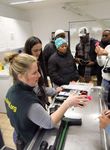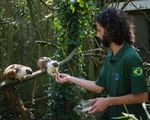Durrell Endangered Species Management Graduate Certificate (DESMAN) 2018
←
→
Page content transcription
If your browser does not render page correctly, please read the page content below
Durrell Endangered Species
Management Graduate
Certificate (DESMAN) 2018
5th February to 27th April 2018
The 12-week DESMAN course, run in Jersey annually, is Durrell’s flagship Jersey-based training programme
for conservationists from around the world. Each year, around a dozen conservation workers travel from all
over the world to study and gain latest skills to maximise their effectiveness at managing or participating in
conservation projects. The course is officially validated as a ‘Graduate Certificate’ by the University of Kent.
Overall aim
The overall aim of the course is to take candidates already showing great potential to become future
conservation leaders, and to provide a broad range of current conservation theory, practical specific skills
in endangered species management, and a range of transferable skills in conservation management,
leadership, communication and fundraising. Together, the course content should enable you to return to
your own country and apply these new skills and knowledge to your work.
What topics will be covered?
The taught component of the course includes the following main topics:
• biodiversity and drivers of species decline • management and leadership skills
• conservation planning and priority setting • facilitation and team skills
• the role of zoos and captive breeding • GIS for conservation managers
• principles of animal husbandry • captive and field research skills
• conservation medicine and wildlife disease • education and community conservation
• small population biology and genetics • fundraising and financial management
• in-situ conservation techniques
DESMAN changed my life, not only professionally but also personally
DESMAN course participantPractical work
You will learn useful skills such as population monitoring
techniques, radiotracking, and practical GIS and spatial
analysis skills. The course also covers the principles of
research design, data management and statistical
analysis for conservation. You will also get the opportunity
to work with Durrell’s animal and veterinary departments,
learning practical aspects of care and maintenance of
animals in a captive environment.
Transferable skills
We put considerable weight on the importance of transferable ‘human skills’ like management,
leadership, running effective teams, communication skills, facilitating workshops with multiple stakeholder
groups etc. – as these are all vital skills for conservation. Conservation is ultimately about working with peo-
ple, understanding their needs and motivations, and trying to alter perceptions, attitudes and behaviours.
Main topics covered (and approximate time allocated)
• Understanding biodiversity (3 days)
• Species conservation prioritisation, and the IUCN Red List (1 day)
• Action planning and planning species recovery projects (2 days)
• Dealing with threats to biodiversity – invasive species, climate change, human-wildlife conflict,
wildlife trade etc (3 days)
• Conservation genetics (2 days)
• The role of captive animal management in species conservation (2 days)
• Animal welfare and conservation (½ day)
• Key aspects of animal husbandry (1 day)
• Conservation medicine (1 day)
• Reintroduction (½ day)
• Population monitoring techniques (2 days)
• Community conservation and ecotourism (1 day)
• Conservation education (1 day)
• Facilitation and communication skills for conservation (5 days)
• GIS skills for conservation (5 days)
• Leadership and team development skills for conservation (4 days)
• Research design, statistical analysis, data management and scientific writing (3 days)
• Project management for conservation (1 day)
• Fundraising and grant-writing skills (1 day)
• Basic project accounting and budgeting (½ day)
• Public relations and using social media for conservation communication (½ day)
• Skills development task (your chance to spend time learning a specific topic of interest) (5 days)
DESMAN was the best experience of my life
DESMAN course participantTeaching staff and guest lecturers
In addition to Durrell’s own expert staff, you will be taught by a wide variety of highly respected
international experts brought in to give greater insight into specialist topics. Over forty people help to
deliver the training on this course.
Some of our DESMAN graduates
We keep in touch with and continue to support our graduates through our graduate network. There are
countless examples of graduates who have returned to their own country inspired by their training
experience in Jersey and have gone on to make incredible achievements in biodiversity conservation.
Here are just a couple of examples…
Laury Cullen, Brazil Kanchana Weerakoon, Sri Lanka Ramesh Chand, Fiji
Research Coordinator at Instituto de Founder and leader of two community Director of Kula Eco Park. Leads the
Pesquisas Ecológicas. Specialises in conservation organisations in Sri Lanka. successful captive breeding project for
leading landscape restoration and Provides grass roots environmental and the critically endangered Monuriki Island
sustainable community agroforestry conservation awareness to children and crested iguana, with the reintroduction
work in Brazil’s Atlantic Rainforest. young adults. phase commencing shortly.
Course Assessment
You will be assessed through the following:
• Written project proposal (and oral presentation)
• Written grant proposal (and oral presentation)
• Written exam papers
• Data manipulation and statistical analysis test
Qualifications gained
• This course is officially validated by the University of Kent as a Graduate Certificate.
• You will also gain a separate leadership qualification from the Chartered Management Institute (subject
to a small amount of extra assessed work).Venue and facilities The course will be held at Durrell Conservation Academy, located at the headquarters of Durrell Wildlife Conservation Trust (Durrell) in Jersey, Channel Islands. Durrell was established by the world renowned naturalist and author Gerald Durrell in 1963 with the primary aim of saving species from extinction. We now run 46 projects in 14 countries worldwide and have played a pivotal role in the successful recovery of several species. In 1984 Gerald Durrell formally established the International Training Centre (now known as Durrell Conservation Academy) as a form of “mini univer- sity” designed to equip conservationists from across the world with the animal management and critical thinking skills required to bring species back from imminent demise. Since this time the Academy has taught over 5000 people from 137 countries. Our facilities include a purpose built lecture theatre, a reference library containing over 11000 volumes and subscriptions to around 200 journals, well- equipped computer lab, classroom, and on-site accommodation. The adjacent Durrell Wildlife Park provides the opportunity to gain practical hands-on experience on our animal, veterinary and education departments. Eligibility To be eligible, you must: • be employed in the field of conservation or in teaching conservation-related topics at graduate or post graduate level, or working towards such employment; • if employed, have the support of your employer and confirmation that, should you be selected, you will be returning to your place of employment after training; • be sufficiently fluent in English to follow technical presentations, read scientific papers, and write short proposals. Please note that this is an intensive course with a considerable workload. Cost and booking information The total cost including all course fees, course materials, fieldtrip costs, university validation fees, on-site accommodation, and all meals is £9000. This also includes a weekly cash stipend of £20 given to participants. A small number of partial scholarships are available on application. Application deadline: 15th October 2017 For further information, or to request an application form, please email academy@durrell.org For full details of all courses, visit www.durrell.org/training Course training partners include:
You can also read



























































